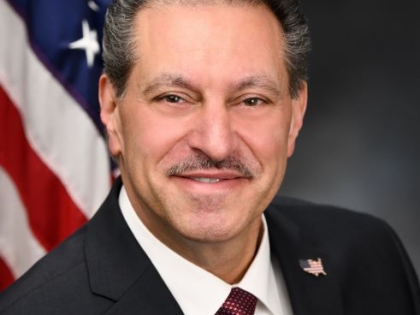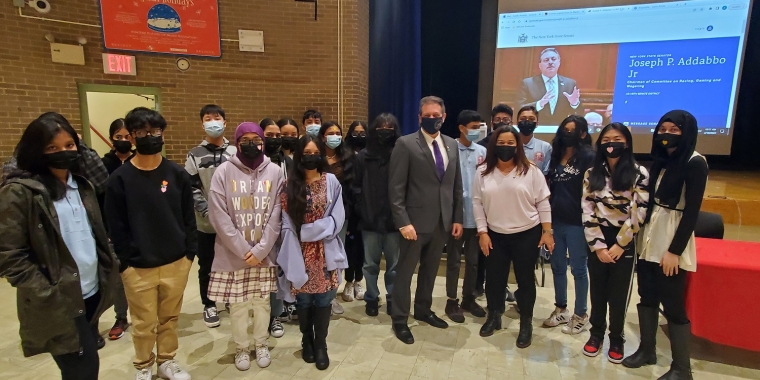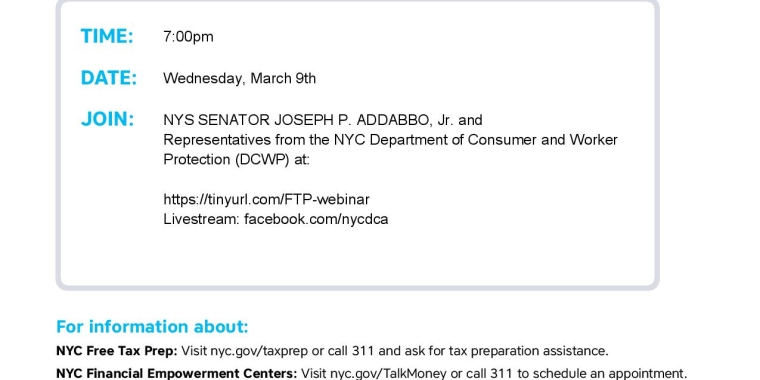
It will take all of us speaking up to end domestic violence
Senator Joseph P. Addabbo, Jr.
September 6, 2022
-
ISSUE:
- Domestic Violence
- Domestic Violence Awareness
- Domestic Violence Victims
- Domestic Violence Hotline
- Addabbo
The issue of domestic violence is a complicated one that can affect anyone across all different backgrounds, ages, cultures, religions, socio-economic status, and other demographics. As an elected official, it is my job to recognize a problem and work to address it, while providing residents with resources to help them navigate the issue.
The messaging for domestic violence should include awareness of credible programs and the need for the victim to speak out and seek assistance, regardless of cultural beliefs or upbringing. The domestic violence services are truly helpful if the victims know they exist and actually come forward to get help.
There are many resources out there for women and men where they can receive assistance, housing and a wide array of services to assist them. While I am seeking to help all victims, I will focus on women since they are disproportionately affected by domestic violence.
According to data from CDC’s National Intimate Partner and Sexual Violence Survey (NISVS), about 1 in 4 women and nearly 1 in 10 men have experienced contact sexual violence, physical violence, or stalking by an intimate partner during their lifetime and reported at least one impact of the violence. Over 43 million women and about 38 million men experienced psychological aggression by an intimate partner in their lifetime. Additionally, about 11 million women and 5 million men who reported experiencing contact sexual violence, physical violence, or stalking by an intimate partner in their lifetime said that they first experienced these forms of violence before the age of 18.
Domestic violence can come in many forms and is not always as noticeable as a black eye or busted lip. Domestic violence may be physical, but there is also mental abuse and financial abuse where victims are made to believe they deserve their abuse, they cannot do any better in life or are restricted from their finances, so they have no other option than to stay with their abuser.
An initial step is to educate possible abusers that they cannot abuse their partners and think they will face no consequences for their actions. The best time for this education is before they become abusers, and there are programs out there to help teach young individuals healthy relationship skills such communication. By teaching teens these skills and utilizing other similar programs, we can stop abuse before it even happens. Once a domestic violence incident occurs, justice must be served upon the abuser.
However, it is not as simple as teaching youth about domestic violence. Many cultures believe women are subservient to men, and in 2022 when we educate and advocate that everyone is equal and free to express themselves, hold jobs and be financially independent, that can cause conflict in cultures and relationships that could lead to violence.
While we are not trying to change entire cultures, we are trying to raise awareness that no person should be subjected to violence just because they are in a relationship or are a child of a certain culture. We are trying to possibly save a human life.
Recently, there was an incident where a young woman, Mandeep Kaur, from the Richmond Hill community committed suicide after emotionally posting online her experience of allegedly being verbally and physically abused by her partner. It was such a shame to see a young life taken away because of another’s abuse. I stood in solidarity with her friends, family and community in remembering Mandeep’s life during a vigil outside of her home. It breaks my heart to know that a mother of small children may still be with us if she felt able to reach out for help from the local services.
If domestic violence does occur in a relationship, victims need to feel safe enough to speak out about their abuse to reliable organizations and find the services available to assist them. There are many credible services and nonprofit organizations that provide social services and resources for children, teens, and families. Many existing programs have the resources that not only help victims of domestic violence, but help break the stigma of silence and assist individuals to speak out about their experiences.
The NYPD has an array of services and information for domestic violence victims on topics such as stalking, seeing the signs of domestic violence and safety planning. Additionally, NYC Family Justice Centers provide free and confidential help for survivors of domestic violence and gender-based violence through safety planning, assistance in applying for shelter, housing and other services, mental health counseling, public benefits and job training programs, and more.
If you are in immediate danger, call 911. If anyone is having suicidal thoughts or tendencies, I urge them to reach out to the new 988 Suicide and Crisis Lifeline, which is a 24/7 hotline with operators that speak several different languages to help in your time of need. I believe the message to domestic violence victims, and to others, should be that regardless of your culture or background – Speak Up and Speak Out!
For more information on domestic violence and related services providing help:
- Visit: https://www.cdc.gov/injury/features/intimate-partner-violence/index.html
- Safe Horizon: Domestic Violence Hotline 800-621-HOPE (4673)
- Sakhi for South Asian Women Helpline 212-868-6741
- Yesodot and their services, visit: https://www.yesodotinc.org/
- NYC Family Justice Centers, visit www.nyc.gov/ENDGBV or call 718-575-4545 in Queens.
- Queens Hospital Center Social Work Services: 718-883-4205
- NYS Domestic Violence Hotline: 800-942-6906.
Share this Article or Press Release
Newsroom
Go to Newsroom
Addabbo drops off student-made Valentine's Day cards to veterans
February 24, 2022

Addabbo mourns the death of a Far Rockaway firefighter
February 17, 2022
